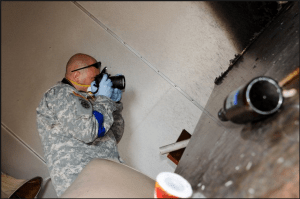Has the VA told you that your injury didn’t occur “in the line of duty”?
Did it lead to a letter from the VA saying your Veterans benefits eligibility was denied?
Confused as to what that means? Here’s the quick “down and dirty”.
Line of Duty Investigations and Reports in the Veterans Benefits Eligibility context.
When I served in the Army, one of my “extra-duties” was to prepare “Line of Duty” investigations and reports.
Basically, when a soldier’s injury interfered with their ability to perform their jobs (or when an accident seriously injured or killed another soldier), we investigated the circumstances of that injury.
Our investigation was meant to draw one conclusion (mostly for UCMJ disciplinary purposes): did the soldier’s injury occur in the line of duty, or was it the result of willful misconduct?
Line of Duty conclusions affect Pillar 1: Veterans Benefits Eligibility.
If a Line of Duty report concludes that a soldier’s injury occurred “in the line of duty”, then the VA is largely stuck with that conclusion.
With only very rare exceptions, the military service finding of “in the line of duty” is binding on the VA.
Now, what if the military service concludes that an injury was not “in the line of duty”, but was the result of “willful misconduct”?
Well, in the words of Ricky Ricardo, the Veteran has some ‘splaining to do.
If the Veteran can show that the injury still would have happened, without the “willful misconduct”, he or she may be able to avoid a determination of ineligibility for VA benefits. This is tough to do, so you are going to want to seek out an attorney to help you on that one.
What if there is no Line of Duty report, and no conclusion by the military service as to whether your injury occurred “in the line of duty” or as a result of “willful misconduct”?
In that situation, the law presumes that your injury was “in the line of duty”.
The VA can rebut that presumption with a “preponderance of evidence” showing not only the willful misconduct, but that the willful misconduct was the “proximate” cause of the injury.
What are the 4 Pillars I Keep hearing about on the Veterans Law Blog?
The 4 Pillars are, in my opinion, the 4 essential elements that every Veteran must prove in every VA Claim (except TDIU and CUE claims, arguably).
Pillar 1: VA Benefits Eligibility
Pillar 2: 5 Paths to Service Connection
Pillar 3: Demystify Impairment Ratings
Pillar 4: Getting the Right Effective Date
The 4 Pillars approach is part of my 8 Step Process for Improving your VA Claim.
Please consider subscribing to the Veterans Law Blog by email.
You are here for a reason. And I’m pretty sure its not because you did a “I’m feeling lucky” search on google.
You’re here because you are having problems in your VA claim.
My vision is to change the way Veterans Experience the VA Claims Process. I do that by providing More Information, and More Power, in More Ways to More Veterans.
Here are the 2 big tools that the Veterans Law Blog offers you to help you beat back the VA at their own game:
Subscribe to the Veterans Law Blog online: click here to see all your options.
5 days a week, the Veterans Law Blog posts topics that Veterans battling the VA need to know. Don’t miss any of them – sign up for email delivery from the Veterans Law Blog.
The Veterans Law Blog also publishes several Field Manuals – 0r eBooks and Videos teaching you the ins-and-outs of the VA Claims process.






